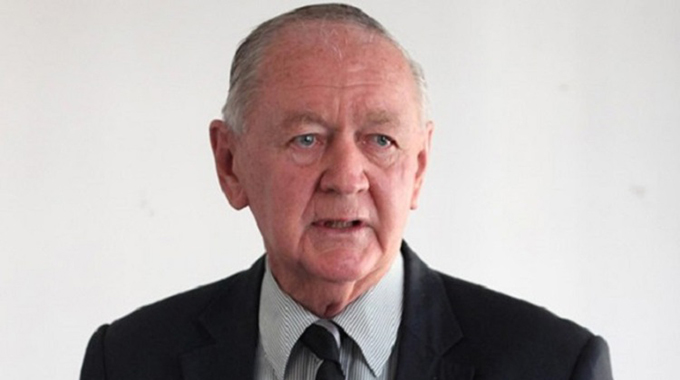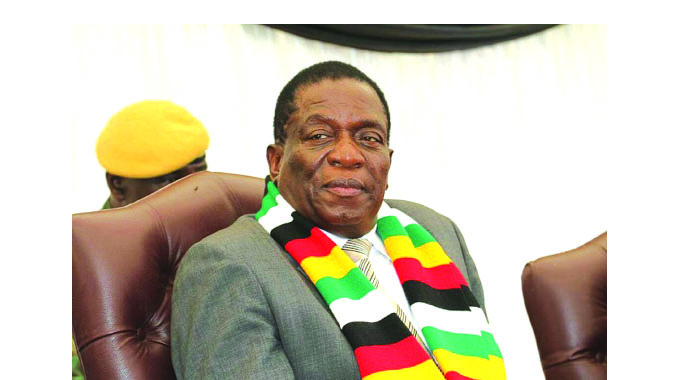Business leaders back Govt currency measures

Oliver Kazunga Senior Business Reporter
CAPTAINS of industry and economic analysts believe the raft of policy measures by the Government to stabilise the local currency will underpin progress towards measured de-dollarisation.
The interventions were prompted by continued depreciation of the Zimbabwe dollar, especially on the parallel market, which has stoked resurgent inflationary pressures in the economy.
Zimbabwe’s annual inflation, which touched a record low in two years when falling to 50,1 percent in June last year in response to Government policy measures, has climbed to 96,4 in April from 74,6 percent in March.
Amid the exchange rate volatility, the Zimbabwe dollar now exchanges hands at between $300 and $400 against the greenback on the open market and $165/US$1 on the auction market.
President Mnangagwa said at the weekend the Government was convinced that the recent exchange rate movements were being driven by negative sentiments by economic agents as opposed to economic fundamentals.
As such, interventions will address issues around excessive liquidity into the economy, speculative borrowing from banks and trading on the stock market and improve confidence in the operation of the forex auction system.
Among other policy pronouncements, domestic foreign currency transfers will now attract an intermediated money transfer tax (IMTT) of 4 percent. Other measures include foreign currency withdrawal levy of 2 percent, settlement of foreign currency tax obligations to the Zimbabwe Revenue Authority in local currency using the willing buyer-willing seller exchange rate from banks and the suspension of lending in foreign currency by banks.
President Mnangagwa said monitoring of financial transactions by authorities had been heightened, certain financial crimes would attract stiff mandatory custodial sentences while the quarterly money supply growth target had been put at zero percent.
To promote long term investments on the stock market, the Government, with immediate effect, reviewed capital gains tax for shares held for a period not exceeding 270 days from 20 to 40 percent in line with individual maximum marginal tax rate for Pay as You Eam (PAYE).
Further, he said the willing buyer willing seller system introduced through banks last month would now be the basis for setting prices in the economy while the amount that can be traded has been increased to US$5 000 per day up to a maximum of US$10 000 per week from US$1 000 daily.
Association for Business in Zimbabwe chief executive officer Mr Victor Nyoni said the latest policy pronouncement by the Government is a step in the right direction towards full dedollarisation.
“Given the prevailing economic situation, we need to make a bold decision to free the Zimbabwe dollar so that it trades freely against major currencies like the US dollar. The latest policy pronouncement by the President is an attempt towards full de-dollarisation in the context of the obtaining situation.
“We now need to shift to fully adopting the Zim dollar and going by statistics of foreign currency reserves that we read and hear about in the media, the country now has enough foreign currency reserves to sustain imports.
“The Zimdollar should now be allowed to trade freely against the US dollar, hence the policy pronouncement by the President is welcome,” he said.
Mr Nyoni said the Government and business needed to find each other and engage more in addressing the challenges affecting economic growth during the transition period to de-dollarisation.
“For example, in the financial services sector where a policy has been announced that banks are no longer able to lend in foreign currency, I think that policy should be a temporary one as the Government undertakes and concludes whatever investigations they are carrying out,” he said.
Buy Zimbabwe, a lobby group that advocates increased consumption of local products, said it had noted measures to reduce inflation and stabilise the local currency announced by the President.
General manager Alois Burutsa said while the measures were welcome, there was need to accelerate local content measures to reduce reliance on imports and external currencies.
“Over the past three years, Zimbabwe’s manufacturing sector has recorded impressive growth in capacity utilisation, which currently stands at an average of 65. However, for this growth to have a meaningful impact on wealth and job creation, there is urgent need to ensure that the quantum and local value by key sectors of Zimbabwe is increased to a minimum of 50 percent.
“As it stands, the mining sector, which leads in the generation of foreign currency imports more than 70 percent of chemicals, equipment and related raw materials. As such, the increase in foreign currency receipts is easily eroded due to high imported content,” Mr Burutsa said.
He added that to grow the economy, save and create jobs the Government should put in place measures that include tax breaks and give preference on auction forex and public procurement to companies that have a minimum local content threshold of 50 percent.
The Confederation of Zimbabwe Industries (CZI) president Mr Kurai Matsheza would not be drawn into commenting, saying his organisation was scheduled to meet yesterday to deliberate on the implications of the latest policy measures to industry and the economy at large.
“We are having a meeting with other members tomorrow and instead of me speaking my personal view, you rather wait until tomorrow when we have a position as a board,” he said.
In its position paper, the Zimbabwe National Chamber of Commerce (ZNCC) said the perennial existence of arbitrage opportunities may continue to threaten economic stability, suggesting the need to avoid legislating against the challenges but address the primary drivers.
The business membership organisation said the primary drivers to the arbitrage opportunities could be addressed through market liberalisation as well as improving policy quality and response to emerging threats.
ZNCC said the Government should be recommended for responding to the obtaining situation but pointed out that the Government was presently the major holder of Zimbabwe dollar deposits and lack of strategic disbursements of those funds into the market had also negatively impacted the currency.
“We urge the Government of Zimbabwe to critically review these measures and seriously consider the submissions that have been put through from the business community.
“Quite a number of quality measures that need to be done to move this economy forward are well-documented and are known within the public domain yet the Government is choosing to ignore such genuine advice.
“The establishment of a social contract and adherence to it between the policymakers and all interested stakeholders need not be emphasised,” it said.
Economic commentator Mr George Nhepera said he understood where the Government was coming from as far as the latest policy measures are concerned.
“Any measure in terms of policy pronouncement has a motive and an objective. In this case, the motive is to arrest the depreciation of local currency and the objective is to quickly arrest the depreciation of the Zimbabwe dollar. Any other consequences that come as a result of the latest policy pronouncement is secondary.
“From the Government side, I can understand that the monetary authorities want to give our local currency some appreciation so it doesn’t slide to US$1: $500.
“Prior to the latest measures, people were borrowing foreign currency for on-lending on the parallel market creating arbitrage opportunities and devaluing the local currency,” he said.
While it appears unorthodox that banks have been cut-off from lending, Mr Nhepera said in the meantime, financial institutions should focus on recovering the money that they have been lending.
“As a result of the latest policy measures, the parallel market exchange rate will not tumble but rather stabilise while curtailing inflationary pressures,” he said.
Political Actors Dialogue (Polad) economic committee chairman Mr Trust Chikohora and ZNCC past president said:
“It is important that the President has issued a statement to try and stabilize the exchange rate so the fact that he has recognized this as the major issue of the moment.
“It’s really welcome because that is what we have been calling for to say this matter must be dealt with as a matter of urgency as it is the biggest problem facing the Zimbabwe economy at the moment.”
He commended the Government for putting in place a number of measures to restore economic stability adding that the compensation of those that had balances of US$1000 or less at the beginning of January 2019 will help in restoring confidence in the banking sector.
“The fact that the inter-bank rate is effectively going to be the rate that is going to be used for pricing is also welcome because the interbank rate is more related to the market. It is determined by market players, so it will take us closer to reality,” said Mr Chikohora.
However, economist Eddie Cross said the latest policy measures were not adequate to address obtaining challenges the monetary authorities would likely review them soon.
“I think the policy package is unworkable and they will soon be forced to review those measures. The statement should have been made after a wide consultation with all stakeholders, I think in this case it was done by a small group of individuals within the Central Bank and Government.
“It is ridiculous that you stop people from lending and promote compensation for loss of value that occurred in 2019,” he said.











Comments